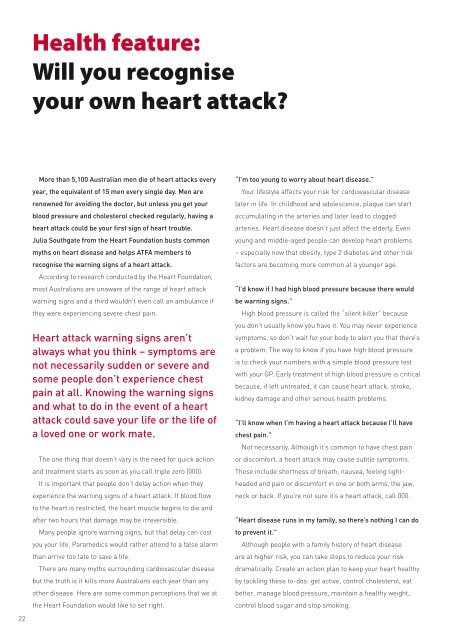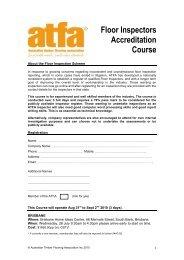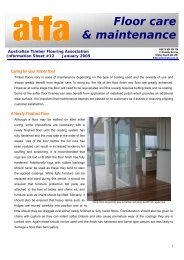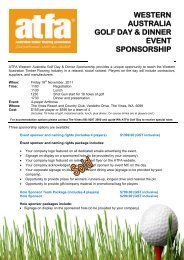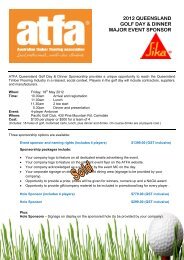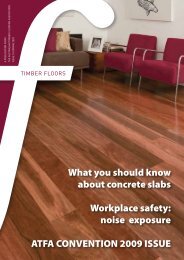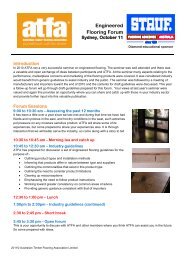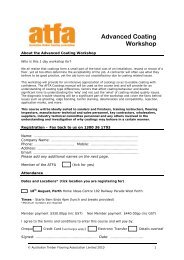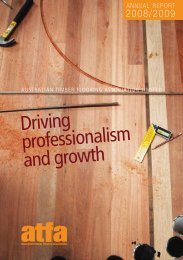hurford hardwood stunning reds - The Australian Timber Flooring ...
hurford hardwood stunning reds - The Australian Timber Flooring ...
hurford hardwood stunning reds - The Australian Timber Flooring ...
Create successful ePaper yourself
Turn your PDF publications into a flip-book with our unique Google optimized e-Paper software.
Health feature:<br />
Will you recognise<br />
your own heart attack?<br />
More than 5,100 <strong>Australian</strong> men die of heart attacks every<br />
year, the equivalent of 15 men every single day. Men are<br />
renowned for avoiding the doctor, but unless you get your<br />
blood pressure and cholesterol checked regularly, having a<br />
heart attack could be your first sign of heart trouble.<br />
Julia Southgate from the Heart Foundation busts common<br />
myths on heart disease and helps ATFA members to<br />
recognise the warning signs of a heart attack.<br />
According to research conducted by the Heart Foundation,<br />
most <strong>Australian</strong>s are unaware of the range of heart attack<br />
warning signs and a third wouldn’t even call an ambulance if<br />
they were experiencing severe chest pain.<br />
Heart attack warning signs aren’t<br />
always what you think – symptoms are<br />
not necessarily sudden or severe and<br />
some people don’t experience chest<br />
pain at all. Knowing the warning signs<br />
and what to do in the event of a heart<br />
attack could save your life or the life of<br />
a loved one or work mate.<br />
<strong>The</strong> one thing that doesn’t vary is the need for quick action<br />
and treatment starts as soon as you call triple zero (000).<br />
It is important that people don’t delay action when they<br />
experience the warning signs of a heart attack. If blood flow<br />
to the heart is restricted, the heart muscle begins to die and<br />
after two hours that damage may be irreversible.<br />
Many people ignore warning signs, but that delay can cost<br />
you your life. Paramedics would rather attend to a false alarm<br />
than arrive too late to save a life.<br />
<strong>The</strong>re are many myths surrounding cardiovascular disease<br />
but the truth is it kills more <strong>Australian</strong>s each year than any<br />
other disease. Here are some common perceptions that we at<br />
the Heart Foundation would like to set right.<br />
“I’m too young to worry about heart disease.”<br />
Your lifestyle affects your risk for cardiovascular disease<br />
later in life. In childhood and adolescence, plaque can start<br />
accumulating in the arteries and later lead to clogged<br />
arteries. Heart disease doesn’t just affect the elderly. Even<br />
young and middle-aged people can develop heart problems<br />
– especially now that obesity, type 2 diabetes and other risk<br />
factors are becoming more common at a younger age.<br />
“I’d know if I had high blood pressure because there would<br />
be warning signs.”<br />
High blood pressure is called the “silent killer” because<br />
you don’t usually know you have it. You may never experience<br />
symptoms, so don’t wait for your body to alert you that there’s<br />
a problem. <strong>The</strong> way to know if you have high blood pressure<br />
is to check your numbers with a simple blood pressure test<br />
with your GP. Early treatment of high blood pressure is critical<br />
because, if left untreated, it can cause heart attack, stroke,<br />
kidney damage and other serious health problems.<br />
“I’ll know when I’m having a heart attack because I’ll have<br />
chest pain.”<br />
Not necessarily. Although it’s common to have chest pain<br />
or discomfort, a heart attack may cause subtle symptoms.<br />
<strong>The</strong>se include shortness of breath, nausea, feeling lightheaded<br />
and pain or discomfort in one or both arms, the jaw,<br />
neck or back. If you’re not sure it’s a heart attack, call 000.<br />
“Heart disease runs in my family, so there’s nothing I can do<br />
to prevent it.”<br />
Although people with a family history of heart disease<br />
are at higher risk, you can take steps to reduce your risk<br />
dramatically. Create an action plan to keep your heart healthy<br />
by tackling these to-dos: get active, control cholesterol, eat<br />
better, manage blood pressure, maintain a healthy weight,<br />
control blood sugar and stop smoking.<br />
22


